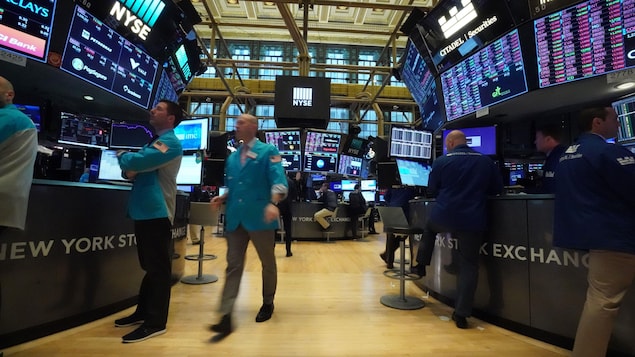A few traders still physically congregate on the Exchange to trade despite the outbreak of the pandemic.
Exchanges will not be affected since electronic transactions will still take place.
In fact, Wednesday was an equally dark day for global financial markets.
Shortly after 1 p.m., trading was automatically halted for 15 minutes on the New York Stock Exchange after the S&P 500 index fell 7%. On the resumption, the movement continued all the same.
At the close, the Dow Jones had fallen 6.3%, the S&P 500 had lost 5.18%, while the NASDAQ had lost 4.7%.
In Canada, the TSX index of the Toronto Stock Exchange fell 7.6%.
The situation is the same in Europe. At the end of the day the main index of the Frankfurt Stock Exchange fell 5.56%, while that of London lost 4.05% respectively.
In Paris, the CAC 40 plunged 5.9%. Airbus stock has crashed 22% given the serious difficulties plaguing the airline industry.
In Asia, the day ended in the red in Shanghai (-1.8%), Hong Kong (-4.2%), Tokyo (-1.7%) and Seoul (- 4.9%). All these exchanges had closed the day of Tuesday with gains of less than 1%.
In all these places, the gains made on Tuesday were erased, not to mention that they were far from compensating for the dizzying drop in world stock markets on Monday.
A security guard wears a mask near a sculpture of a bull, symbol of a bull market, near the Shanghai Stock Exchange. The markets are now in bearish territory.
Photo : Reuters / Aly Song
—
On Tuesday, the North American stock markets ended the session higher, investors being encouraged by various measures announced by the US Federal Reserve and by the stimulus plan being considered by the Trump administration.
Oil prices are sinking
Oil prices also continued their descent on Wednesday, with the US benchmark barrel (West Texas Intermediate) hitting its lowest price since 2003.
At the end of the day, the US (WTI) and European (Brent) benchmark prices were worth US $ 20.37 and US $ 24.88, showing respective falls of 24.42% and 13.4% since the close of the market. Eve.
The price of black gold is caught between an overflowing supply and a global demand undermined by the coronavirus pandemic.
Crushed demand, oversupply and supply war between Saudi Arabia and Russia put investors in big trouble
, summarizes Naeem Aslam, market analyst at Avatrade.
The downward pressure is expected to continue until Saudi Arabia and Russia become sane again, which is certainly not the case at present
adds his colleague Carsten Fritsch of Commerzbank.
On Tuesday, Riyadh instead announced that it wanted to increase its oil exports to more than 10 million barrels per day, putting additional pressure on prices.
–


